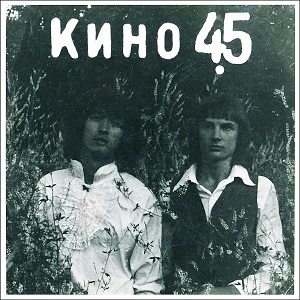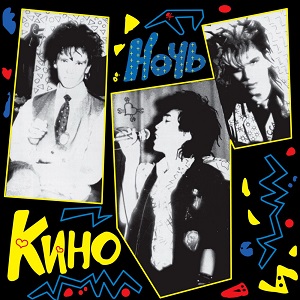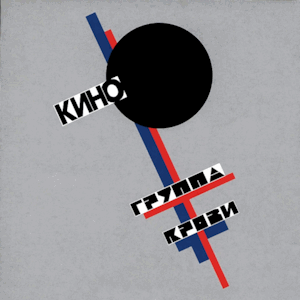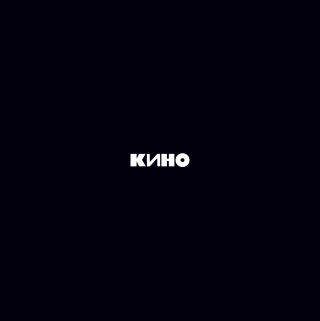
Viktor Robertovich Tsoi was a Soviet singer-songwriter and actor who co-founded Kino, one of the most popular and musically influential bands in the history of Russian music.
Kino is a Russian rock band formed in Leningrad in 1981. The band was co-founded and headed by Viktor Tsoi, who wrote the music and lyrics for almost all of the band's songs, until his death in 1990. Over the course of eight years, Kino released over 90 songs spanning over seven studio albums, as well as releasing a few compilations and live albums. The band's music was also widely circulated in the form of bootleg recordings through the underground magnitizdat distribution scene. Viktor Tsoi died in a car accident in 1990. Shortly after his death, the band broke up after releasing their final album, consisting of songs that Tsoi and the group were working on in the months before his death.

45 is the debut studio album by Soviet rock band Kino. It was recorded in 1982 in the AnTrop studio, owned by Andrei Tropillo and distributed as magnitizdat. At the time, Kino consisted of Viktor Tsoi and Aleksei Rybin. Boris Grebenshchikov provided additional instrumentation and musical production. Other members of Akvarium also helped with recording.

Zvezda po imeni Solntse is the seventh studio album by the Soviet rock band Kino, released on August 29, 1989. The album was the last album released before lead vocalist Viktor Tsoi's death.

Nachalnik Kamchatki is the third studio album by Soviet rock band Kino. The name of the album is a play on the title of the 1967 Soviet film Chief of Chukotka.

East L.A. Breeze is the fifth studio album of the indie group Brazzaville. For the first time this CD was released by a Soyuz Records sub-label Zakat in 2006. Until released by some Western record label, the album's been available only in CIS.

Eto ne lyubov... is the fourth studio album by Soviet rock band Kino. It was released in 1985.

Noch is the fifth studio album by Soviet rock band Kino, released in 1986. It is the group's first official album release.

Gruppa krovi is the sixth studio album by Soviet post-punk band Kino, first released in 1988. Released at the height of Perestroika and Glasnost, together with a crime thriller titled The Needle released in the same year starring lead vocalist Viktor Tsoi, it would go on to be the band's most popular album both inside and eventually outside the Soviet Union, with songs from the album, including the title track, commonly being listed among top 100 lists of Russian music.

The untitled album is the eighth and final studio album of the Soviet rock group Kino. It was released in December 1990 by Metadigital on vinyl. The rough demo version was recorded in the Latvian village Plieņciems and according to the guitarist of the group Yuri Kasparyan, finished on the 14th of August that year - the day before the death of the frontman Viktor Tsoi in a car crash. The remaining members of Kino completed the album as a tribute to Tsoi.
Alexander Viktorovich Tsoi, also known under the pseudonym Alexander Molchanov is a Russian performer, composer, designer and designer, former guitarist of the band "Para bellvm", author of the video effects of the project "Symphonic Kinot", and leader of the musical project Ronin.

Yuri Dmitriyevich Kasparyan is a Russian musician best known for his time as the guitarist of the Soviet rock band Kino and as a member of Vyacheslav Butusov's group U-Piter.

Assa (Асса) is a 1987 Soviet crime film directed and co-written by Sergei Solovyov. It became a cult film, mainly due to the fact that it was one of the films that brought Russian rock music from the underground into the mainstream. Solovyov made a sequel to the film twenty years later, 2-ASSA-2.
"Zvezda po imeni Solntse" is a song by the Soviet rock band Kino from the album of the same name released in 1988. The song is generally considered to be one of Kino's most popular songs. It is popular among novice guitarists in Eastern Europe, and there are many cover versions. The song is broadcast daily by Russian radio stations.
"Smotri – eto kino..." is the last known recording by the Russian-Korean (Koryo-saram) musician Viktor Tsoi. The title is a pun with the name of Tsoi's band Kino.
"Pack of Cigarettes" is a song by the Soviet post-punk band Kino from the album Zvezda po imeni Solntse released in 1988. One of Kino's most popular songs. It was written in 1988, when Viktor Tsoi was filmed in The Needle.
"Spokoynaya nochʹ" is a rock ballad by the Soviet rock band Kino. Most of the music and lyrics were written by Viktor Tsoi, and the guitar solo was written by Yuri Kasparyan. The song was fully rehearsed and presented at the Leningrad Rock Club Festival in 1986, but was first released on the album Gruppa krovi in 1988. Later, the song was released on the disc Acoustic Concert 2 and in the collections Posledniy geroy in 1989, and Lstoriya etogo mira in 2000.
"Zakroy za mnoy dver', ya uhozhu", or simply "Zakroy za mnoy dver'" is a song by the Soviet rock band Kino from their sixth studio album, Gruppa krovi. The author of the lyrics and music is Viktor Tsoi. The keyboard solo for the recording was played by pianist Andrey Sigle. At concerts, the song was performed in a simplified version without the keyboard solo.
"Konchitsya leto", also referred to as "Leto" or "Ya zhdu otveta" is a song by the Soviet rock group Kino from the Black Album, written in the spring of 1990 and released after the death of frontman Viktor Tsoi. The song was recorded at a port studio at a dacha in Plienciems, where Tsoi went to relax after a concert at Luzhniki Stadium.
Kogda tvoya devushka bolʹna is a song by the Soviet rock band Kino, included in the "Black Album", released after the death of its author, Viktor Tsoi. The song was actively performed by the band's musicians at apartment concerts since 1988. Tsoi had plans to create a boy band that would perform "pop" songs, including "Kogda tvoya devushka bolʹna". Due to its poppier tone and songwriting, the song was not placed on records at the time of its initial performances. Despite the song also not fitting into the atmosphere of the "Black Album", Kino's musicians believed that the public should hear it.











